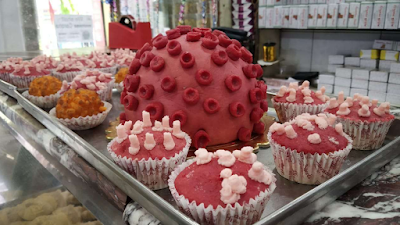The apprehensions emerged after two Chinese cities found traces of coronavirus in frozen chicken wings imported from Brazil and on the outer packaging of frozen Ecuadorian shrimp.
The World Health Organization said on Thursday there was no evidence of the coronavirus spreading through food or packaging, putting to bed doubts among those concerned the virus would enter the food chain.
"People should not be afraid of food, packaging or processing or delivery of food," WHO emergency program manager Mike Ryan told a conference in Geneva.
"There is no evidence that food or the food chain is involved in the transmission of this virus. And people should feel comfortable and safe," he added.
The apprehensions emerged after two Chinese cities found traces of coronavirus in frozen chicken wings imported from Brazil and on the outer packaging of frozen Ecuadorian shrimp.
On the issue, WHO epidemiologist Maria Van Kerkhove said that "very few, less than 10" food packages had been found positive for the virus among hundreds of thousands of packages tested.
Meanwhile, Brazil, the country from which food packaging tested positive for the virus, had said it wanted clarification on the Chinese findings, adding it was not responsible for what was arrived at the goods after they left the country.
The COVID-19 virus had killed nearly 750,000 and infected more than 20.69 million people worldwide.
Meanwhile, Russia will start production of its COVID-19 vaccine within two weeks, the country's Health Minister Mikhail Murashko said.
The world's first registered vaccine against the novel coronavirus was announced Tuesday by President Vladimir Putin in an online meeting with government officials.
The vaccine, named Sputnik V, was developed by the National Center for Epidemiology and Microbiology in Gamaleya, alongside the Russian Direct Investment Fund.
Russia plans to produce at least five million doses of the vaccine per month from December to January, according to Alexander Ginsburg, director of the National Research Center in Gamaleya.
According to a Reuters report, immunologists and infectious disease experts say Russia's decision to claim first place in the global race to develop a COVID-19 vaccine could be a "reckless" step.
The report quotes François Balloux, an expert from the Institute of Genetics at University College London, who called it a "reckless and senseless decision".
"Mass vaccination with a poorly tested vaccine is unethical. Any problem with the Russian vaccination campaign would be disastrous both in its negative health effects, but also because it would further delay the acceptance of the vaccine... In the population, ”Balloux said.
Meanwhile, Germany has also questioned the quality and safety of the coronavirus vaccine launched by Russia.
"There are no known data on the quality, efficacy, and safety of the Russian vaccine." a spokeswoman for the health ministry told German newspaper network RND.
"Patient safety is of the highest priority," he added
The World Health Organization said on Thursday there was no evidence of the coronavirus spreading through food or packaging, putting to bed doubts among those concerned the virus would enter the food chain.
"People should not be afraid of food, packaging or processing or delivery of food," WHO emergency program manager Mike Ryan told a conference in Geneva.
"There is no evidence that food or the food chain is involved in the transmission of this virus. And people should feel comfortable and safe," he added.
The apprehensions emerged after two Chinese cities found traces of coronavirus in frozen chicken wings imported from Brazil and on the outer packaging of frozen Ecuadorian shrimp.
On the issue, WHO epidemiologist Maria Van Kerkhove said that "very few, less than 10" food packages had been found positive for the virus among hundreds of thousands of packages tested.
Meanwhile, Brazil, the country from which food packaging tested positive for the virus, had said it wanted clarification on the Chinese findings, adding it was not responsible for what was arrived at the goods after they left the country.
The COVID-19 virus had killed nearly 750,000 and infected more than 20.69 million people worldwide.
Meanwhile, Russia will start production of its COVID-19 vaccine within two weeks, the country's Health Minister Mikhail Murashko said.
The world's first registered vaccine against the novel coronavirus was announced Tuesday by President Vladimir Putin in an online meeting with government officials.
The vaccine, named Sputnik V, was developed by the National Center for Epidemiology and Microbiology in Gamaleya, alongside the Russian Direct Investment Fund.
Russia plans to produce at least five million doses of the vaccine per month from December to January, according to Alexander Ginsburg, director of the National Research Center in Gamaleya.
According to a Reuters report, immunologists and infectious disease experts say Russia's decision to claim first place in the global race to develop a COVID-19 vaccine could be a "reckless" step.
The report quotes François Balloux, an expert from the Institute of Genetics at University College London, who called it a "reckless and senseless decision".
"Mass vaccination with a poorly tested vaccine is unethical. Any problem with the Russian vaccination campaign would be disastrous both in its negative health effects, but also because it would further delay the acceptance of the vaccine... In the population, ”Balloux said.
Meanwhile, Germany has also questioned the quality and safety of the coronavirus vaccine launched by Russia.
"There are no known data on the quality, efficacy, and safety of the Russian vaccine." a spokeswoman for the health ministry told German newspaper network RND.
"Patient safety is of the highest priority," he added

No comments:
Post a Comment